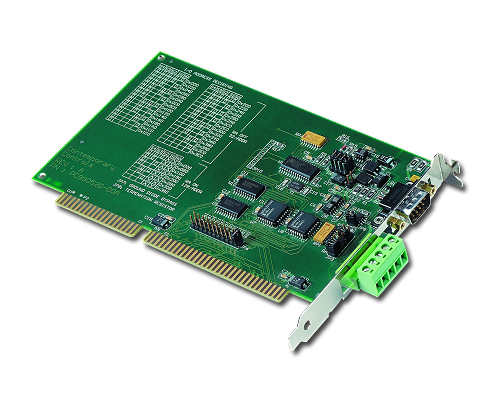CANISA Interfaces PC/8-bit ISA Computers to the CAN Network

Product Support
Regulatory Compliance
Product Overview
- Interfaces CAN to ISA-compatible computers
- Highly-featured Philips SJA1000 controller
- Compatible PCA82C200 mode (defaults to BasicCAN mode)
- Extended receive buffer (64-byte FIFO)
- CAN 2.0B protocol compatibility
- Supports both 11-bit and 29-bit identifiers
- 16 MHz clock frequency
- Drivers available for Windows® 98/ME/2000/XP, Linux and DOS
- Choice of either open-style screw terminals or DE-9 connector
- Data rates up to 1 Mbps
Product Details
The CANISA functions as a Controller Area Network (CAN) adapter for ISA bus computers. This product supports 8-bit transfers and benefits from the additional interrupts on the expanded AT bus.
It incorporates the Philips SJA1000 CAN standalone controller chip which is widely-accepted in both automotive and industrial environments. The CANISA is backward compatible with its predecessor, the 82C200, but has more advanced features. The SJA1000 operates in either BasicCAN (11-bit identifiers) or the new mode called PeliCAN which supports the CAN 2.0B specification (29-bit identifiers). This controller chip maintains extended frame passivity while in the BasicCAN mode.
The SJA1000 is equipped with a 16 MHz clock, a larger receive buffer and better acceptance-filtering-including the ability to extend the acceptance mask to the data field. It can operate at data rates up to 1 Mbps.
The PeliCAN mode includes this list of features: error counters with read/write access; programmable error warning limit; last error code register; error interrupt for each CAN-bus error; arbitration lost interrupt with detailed bit position; single-shot transmission (no retransmission); listen-only mode (no acknowledge, no active error flags); acceptance-filter extension (4-byte mask); and reception of "own" messages (self-reception request).
Designed with the DeviceNet physical layer, it has an optically-isolated transceiver providing reverse-voltage and short-circuit protection. Field connectors include DeviceNet 5-position open-style and DE-9.
Open source Linux drivers for the CANISA can be obtained online by surfing the Internet for SJA1000 drivers.
Ordering Information
| Model | Description | ||
| CANISA-DN | SJA1000 CANISA NIM | Contact Us | |